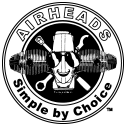Many are intimidated by electricity, and the amount of electrical problems with Airheads can be a sore point. Most often problems are due to lack of regular maintenance, particularly cleaning and tightening various connections, checking alternator brushes, changing the battery before a catastrophic battery failure; and general old age and mileage. This is really not much different from other motorcycles. If properly maintained, the Airheads electrical system works fine and is reliable. If, however, the bike is ridden mostly in stop and go city traffic, the charging system may not keep up, and the battery might require nightly re-charging. The Smart type of chargers are especially convenient for that purpose.
The stock charging system starts producing usable amounts of electricity at ~2000 rpm, but upwards of 4000 rpm may be required for enough output to take care of lights (including extra lighting), ignition, heated clothing, accessories, and have electricity left-over for re-charging the battery. Aftermarket alternators of higher output are available that fit inside the timing chest area.


